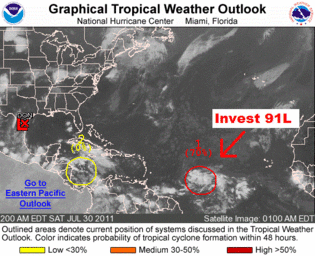 A developing tropical system, destined to become Emily early this week, will threaten the Antilles first and could approach part of the U.S. coastline this weekend, including Miami and the Florida Keys.
A developing tropical system, destined to become Emily early this week, will threaten the Antilles first and could approach part of the U.S. coastline this weekend, including Miami and the Florida Keys.
The National Hurricane Center has given this storm a 70% chance of developing into a tropical cyclone in the next 48 hours. No matter what path this storm takes, it will be in conditions that favor intensification into a hurricane for the next 24 to 48 hours. In sum, this is a storm that bears monitoring over the next few days.
If this developing storm does become a named storm, its name will be Emily.
The 2011 Hurricane Season Has Been An Active One So Far This Year
So far this year, there have been three named storms to date, in the Atlantic. Historically speaking there is typically only one named storm in the Atlantic between June and July.
Only once has there been a hurricane season in which four, or more, named storms developed during July.
That was back in 2005, the year that gave us before Hurricanes Katrina, Rita, and Wilma.
But back in 2005, and before we had Hurricanes Katrina, Rita, and Wilma, we had Hurricane Emily. In July of 2005, Hurricane Emily was one of five named storms. And it was a monster.
With sustained winds of 160 miles per hour, Hurricane Emily became the strongest hurricanes ever to form before August. Indeed, Hurricane Emily was the first category 5 hurricane of the record breaking 2005 hurricane season.
Time To Prepare
With hurricane season upon us, now is the time for all individuals and businesses alike throughout South Florida to properly plan for hurricane season. Our Miami insurance dispute lawyers would like to urge you to take the time now to plan for hurricane season.
Please visit this blog to learn useful tips on planning for hurricane season, and please contact our office should you sustain any hurricane/wind storm related damage.
—–
EXTENDED BODY:
Consider Your Options. Contact Us Today.
Before opening our law firm in 2006, our attorneys worked for some of the state’s, and nation’s, largest law firms, and worked representing the insurance companies for years. Our attorneys are now uniquely positioned to use that experience to assist individuals and businesses alike throughout Florida with their insurance claims. As a result, our attorneys are well versed in the impact insurance has on businesses, condominiums, and individuals alike. Our insurance litigation practice group is prepared to tackle your insurance claim.
Given our extensive experience litigating for, and against, insurance companies, our insurance litigation practice group is prepared to provide aggressive, efficient and effective representation on a broad spectrum of insurance claims in Florida for local, national, and international clients. We are prepared to advocate insurance claims at the pre-suit stage, trial, appellate and arbitration levels.
If you are facing a dispute over an insurance claim in Florida, contact Alvarez & Barbara, LLP, for a free and confidential consultation to discuss your rights.
Call us today toll free at 1-866-518-2913 or at 305-263-7700.